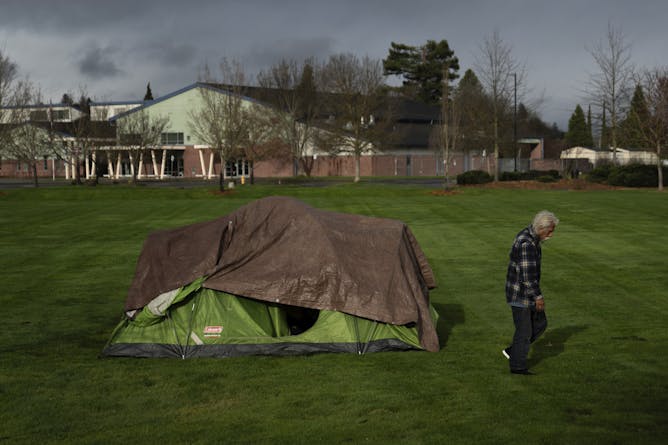|
Top headlines
Lead story
It’s never comfortable to see people who are homeless camping out in a public park or under a highway overpass. But should cities be able to fine or arrest people for sleeping in public if they can’t offer space in shelters?
The Supreme Court will consider this question on April 22 in City of Grants Pass v. Johnson. Though the case originated in a small Oregon city, it has implications for addressing homelessness nationwide.
According to University of Southern California law professor Clare Pastore, previous rulings have viewed criminalizing someone for their status – such as being homeless or addicted to drugs – as cruel and unusual punishment. She explains how a ruling in favor of the city could worsen racial inequality in the U.S.
[ Sign up for our weekly Global Economy & Business newsletter, with interesting perspectives from experts around the world. ]
|

A homeless person near an elementary school in Fruitdale Park in Grants Pass, Ore.
AP Photo/Jenny Kane
Clare Pastore, University of Southern California
Legal precedents hold that criminalizing someone for their status, such as being homeless, is cruel and unusual punishment. But what if that status leads to actions like sleeping in public spaces?
|
Environment + Energy
|
-
Riley Duren, University of Arizona
Methane is a potent greenhouse gas that can leak from oil and gas wells, pipelines and landfills. Satellites can spot the releases fast enough to get them fixed and help protect the climate.
-
Alexander L. Metcalf, University of Montana
Whether people are hunters can have a big effect.
|
|
Arts + Culture
|
-
Krupa Shandilya, Amherst College
Thanks to a strong oral Urdu literary tradition in South Asia, poems from the past linger in the popular imagination.
|
|
Science + Technology
|
-
Jennifer Forestal, Loyola University Chicago
There is no shortage of horror stories about online shaming, but it’s not always a bad thing. It comes down to who is doing the shaming and how cohesive the online community is.
-
Siwei Lyu, University at Buffalo; Yan Ju, University at Buffalo
New research found a way to both improve the accuracy of deepfake detection algorithms while also enhancing fairness.
-
Mariana Noto Guillen, UMass Chan Medical School
There are many ways to kill microbes that cause dangerous infections. Combining genetic screening with machine learning can help researchers identify new antimicrobials.
-
Amy Lien, University of Tampa
Where specialized algorithms fail to classify star-borne pulses, human volunteers with just a little training can step in.
|
|
Economy + Business
|
-
Aaron Zeiler, University of Florida; Ann Searight Christiano, University of Florida
Boasting about centering your transformative systems change paradigm means you’re doing it wrong. But fixes are available.
|
|
Politics + Society
|
-
Michael A. Allen, Boise State University; Carla Martinez Machain, University at Buffalo; Michael E. Flynn, Kansas State University
The disintegration of the United States’ relationship with Niger following its military coup in 2023 is giving way to stronger ties between the African country and Russia and China.
|
|
International
|
-
Craig Mark, Temple University
During a state visit to the White House, the US and Japanese leaders announce a suite of new agreements aimed at countering China’s growing power.
-
Christopher P. Davey, Binghamton University, State University of New York
Rwanda shapes conflict in the region by using the Congolese Tutsi to centre its claims of a continued threat of genocide.
|
|